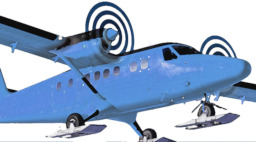
Foreword
To the memory of David K.
There’s a sense of surreality when elements of a fictional story you are writing seem to play out in real life, almost as if you are standing outside and watching real life through a warped pane of glass. That surreality is tinged with horror when you realize that what you’ve been writing about has now happened not to a random person but to a colleague.
A few months after I started putting together this story about the risks, pressure, and decisions a pilot faces, a coworker crashed and perished. I cannot say I knew him more than in passing, for I only met him briefly, once. The accident was still a shock and a sober reminder that, no matter how routine the job becomes, it's essential to stay vigilant.
The circumstances were eerily similar to the ones I created for The Last Link– night, bad weather, mountains, a sudden change in plans, and the end of a long flying day. We do not know many of the details of what happened on the flight, and probably never will. We can only assume what actions were taken or neglected and say, with perfect hindsight, which were wrong. We are all weak; we all make mistakes. There were several times when, but for more fortuitous circumstances or one correct decision, I might have shared the same fate.
Pilots in particular can be harsh judges of the actions of their colleagues, but for good reason– it is only by internalizing the hard lessons others have learned that we improve ourselves. As an evaluator, I have come to see pilots as having a dual nature; there is the professional entity and the human, and by separating them it’s possible to objectively judge their performance while not letting that affect your perception of the person.
For David, all I have any right to say is that he will be greatly missed by his family, his friends, and those who worked with him. Godspeed, and rest in peace.
~~ ~~ ~~ ~~ ~~ ~~ ~~
I wrote this quite a while back, while events were fresh. After I wrote it, I felt that it wasn't appropriate to add it, for it was real while my story was a combination of preaching and fantasy, and I feared I would be using tragedy for promotion.
I do so now because the perspective I gained led to some significant changes in the story while reinforcing the original goal I had: To show how tragedies are formed from a multitude of minor decisions, unexpected conditions, and happenstance events. In aviation (and probably most industries) it's termed the "accident chain," the concept that no one factor is the sole cause of an accident. Rather, a series of minor mistakes and poor decisions pile on top of each other, reducing the margin of safety until it is nonexistent, at which point even a small event can become the immediate cause– a chart misread in turbulence, a number misdialed on a radio, even a dropped pen that distracts the pilot. Each decision, each condition, each factor becomes a link in the chain. In theory, if you prevent the forging of a single link, you can prevent the accident itself.
But that overlooks the fact that frequently it is not the final link which completes the chain, but one forged in the middle. Beyond a certain point, there is no mitigating the risks taken, and no opportunity to correct the situation. These are the situations that give pilots ulcers, the ones that leave us deliberating and staring at charts and briefings, weighing factors and risks to make a go/no-go decision based on expectations and probabilities.
Modern technology has reduced this with reams of data and complex forecasting, but in the end there are still unknowns to every flight– weather changes, and the models can be wrong. Risk can never be eliminated; if we were to attempt that, we'd never fly. Instead, we seek to reduce it, to mitigate it, and to have a backup plan. All of these, though, depend on a pilot making the right decisions at the right time. We are all weak; we all make mistakes, and there are no guarantees in life.
Like life, aviation is never perfectly safe. In part, that's why some of us love it so, for in the absence of risk it's hard to truly feel alive.

Well put.
I've heard that there are no old, bold pilots.
Also, there's an old saying among railroaders that the rulebooks are written in blood*, since every rule in the book is the result of a fatality.
Sometimes I'd get impatient while my brother pre-flighted his plane, but I kept my mouth shut because I knew from reading his copies of Flying magazine that there was no substitute to doing it right ever single time. Some of that has even percolated through my thick skull at work: I once called a customer and asked him to bring his car back beacuse I couldn't remember if I'd torqued the wheels. I was pretty sure that I had, but there was a nagging doubt that I'd forgotten after I had to answer a phone call.
I don't think pilots are alone in the harsh criticism of their fellows department. Heaven only knows that most drivers think they're above average. I think I'm an exception to that rule; I have a very good safety record while driving because I know I'm a bad driver. That, and I generally plan in advance for things going wrong.
That, and I generally plan in advance for things going wrong.
*if a straight-up pony-vs.-machine story set in the steam railroad age is something you'd be interested in, you may want to give The Descendant's The Railway Ponies: Highball a look.